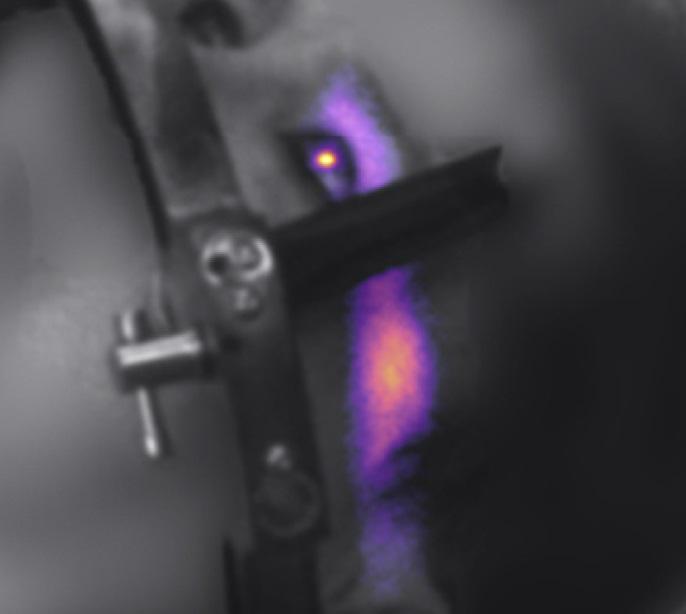What are the flashes of light patients report seeing during brain radiotherapy? Dartmouth scientists capture this phenomenon for the first time and provide an explanation.

Credit: Lesley Jarvis, MD, PhD
LEBANON, NH – For decades, theories have existed to explain patient reports of seeing light flashes during radiation therapy, even with their eyes closed. However, no one has been able to secure evidence of this sensation in humans to prove their theory. A team of researchers at Dartmouth’s and Dartmouth-Hitchcock’s Norris Cotton Cancer Center led by radiation oncologist Lesley Jarvis, MD, PhD and Irwin Tendler, MEng, have collected real-time data to show that during head and neck radiation therapy, enough light is produced inside the eye to elicit such a visual sensation. This evidence, and their explanation of it, “Experimentally Observed Cherenkov Light Generation in the Eye During Radiation Therapy,” is newly published in The Red Journal (International Journal of Radiation Oncology, Biology, & Physics).
“Overall, the idea of imaging light emission from humans undergoing radiotherapy is novel and was also first suggested and developed at Dartmouth,” says Tendler. “Our newest data is exciting because for the first time, light emission from the eye of a patient undergoing radiotherapy was captured. This data is also the first instance of evidence directly supporting that there is enough light produced inside the eye to cause a visual sensation and that this light resembles Cherenkov emission.”
Light emission from the eye is very subtle, hard to detect, and likely why no one has been able to record evidence of this phenomenon. To accomplish this, the team leveraged special technology called the CDose camera imaging system, an engineering innovation manufactured by Dartmouth spin-off company, DoseOptics, LLC. The camera provides live views of light emission from biological systems (animal and human) during radiotherapy. “As the radiation beam passes through the eye, light is generated within the vitreous fluid. Our real-time data rigorously showed that the amount of light produced is sufficient to elicit a visual sensation–a topic that has been debated in the literature,” explains Tendler. “By analyzing the spectral composition, we also show that this emission can be classified as Cherenkov light–again, another contested point in the literature.”
The benefits of the team’s finding to cancer treatment are several-fold:
- The imaging technique could be used to monitor light emission from the eye during radiotherapy and directly determine whether radiation transects the eye. “In the case that the eye is a target, the method could provide confirmation of beam delivery; in the case that this is unintentional, it can provide evidence of an error or near miss – as a safety check,” says Tendler.
- The ability to provide the patient with a valid explanation of this phenomenon can help relieve treatment-related anxiety.
- “Published work has shown that if a patient doesn’t see light flashes during radiotherapy, there is a higher chance of expecting vision loss after irradiation,” says Tendler. The method could help determine if any light was actually generated to potentially relate this to predicted vision loss as well as provide information about long-term visual outcome following radiotherapy.
The team’s next steps are to correlate how recorded ocular Cherenkov light and delivered dose can provide information about long-term visual outcome, and to develop the tool to use in prediction and measurement of eye dose.
###
Irwin Tendler, MEng, is a biomedical engineering and medical physics PhD candidate at Dartmouth’s Thayer School of Engineering studying under Drs. David Gladstone, Brian Pogue, and Lesley Jarvis. His research interests include development of optical imaging-based medical devices to improve safety and efficacy of radiotherapy.
Lesley Jarvis, MD, PhD, is a radiation oncologist and member of the Translational Engineering in Cancer research program at Dartmouth’s and Dartmouth-Hitchcock’s Norris Cotton Cancer Center, and Associate Professor of Medicine at Dartmouth’s Geisel School of Medicine.
About Norris Cotton Cancer Center at Dartmouth-Hitchcock
Norris Cotton Cancer Center combines advanced cancer research at Dartmouth’s Geisel School of Medicine with patient-centered cancer care provided at Dartmouth-Hitchcock Medical Center in Lebanon, NH, at Dartmouth-Hitchcock regional locations in Manchester, Nashua and Keene, NH, and St. Johnsbury, VT, and at partner hospitals throughout New Hampshire and Vermont. It is one of 51 centers nationwide to earn the National Cancer Institute’s “Comprehensive Cancer Center” designation. Learn more about Norris Cotton Cancer Center research, programs, and clinical trials online at cancer.dartmouth.edu.
Media Contact
Jaime Peyton, Director of Communications
[email protected]
603-653-1978
Related Journal Article
http://dx.




